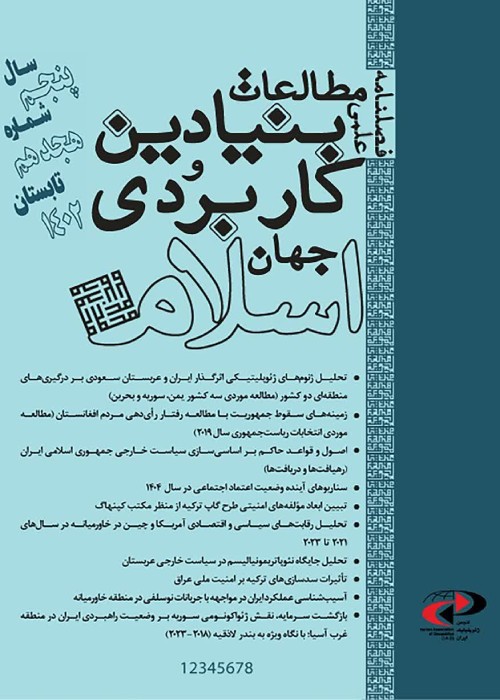New Approach in Explaining Identity Boundary in the Age of Globalization (Case Study: Cultural-Ethnic Field around the Caspian Sea)
Frontiers and borders are among the topics in political geography and disciplinary geography that have a prominent and important place in establishing order and security in the country and prevent the entry of insecurity across borders of the country. Over the past centuries, this importance of borders has led to the formation of extensive studies and researches on borders, especially international borders. The process of studying borders in the past centuries, especially in the twentieth century, mostly included the historical aspects of borders, agreement, delimitation and marking, and the resulting issues, and good progress was clearly made in concepts related to borders. The methods of demarcating borders and marking them and to some extent controlling and maintaining have helped to increase the understanding of international ones. Therefore, the Caspian Basin, due to the special conditions of political and geopolitical geography and also political, historical, military and sociological issues, is one of the most critical and important points in the world and the issue of demarcation and security in this region. It is very important for the surrounding countries, the great powers and other parts of the world. After the collapse of the Soviet Union, the Caspian Basin became a place for the most intense ethnic and political conflicts in the region. In this regard, this study deals with the demarcation of the identity formed in the Caspian region and the root of these conflicts. The main question of the research is which key factor has mostly affected the identity-cultural demarcation of the Caspian Basin? . The current research hypothesis is that "identity, ethnic-cultural differences" in the Caucasus and the Caspian Basin appear to be one of the key factors influencing the region's identity demarcation.
The main method of this research is descriptive-analytical due to its theoretical nature. Accordingly, in this research, in addition to the correct depiction of the concept of identity demarcation, it has been tried to explain it in the Caspian region. Library and Internet resources have been used to gather information in this study.
The Caspian region is gaining meaning and importance because governments live in a common area with each other and have a common future. Accordingly, there is a regional system when regional governments and external actors believe that these governments are the creators of a region. IF countries that are close to each other in a geographical area see each other as a regional system, so, under certain conditions, they can facilitate cooperation among themselves and, under other circumstances, they can even increase conflict. In this way, governments will work together to establish peace and security when they share a common vision of each other's shared resources and believe in the principle that while maintaining their identity, they can communicate with each other. Because of the changes in identity of states with changing values and norms at the domestic and foreign levels, the interests of states and, consequently, the behavior of their foreign policy can never be considered a fixed and stable issue. As a result, depending on the type of identity and the interaction of states, we see different anarchic cultures at different levels.
The collapse of the Soviet Union in 1991 changed the political, economic, military and Marginalization structure of the world, as well as NATO expansion in this area, adding to the legal and border regime in this area. Therefore, the formation of the Caspian region on the political map in the world is considered one of the obvious consequences of this important historical event. The region has a special legal, security and economic position in regional and international relations, as well as the challenges of the Caspian region in terms of identity and ethnic pluralism. In this regard, the events of September 11, 2001 had the greatest impact on the Caspian Sea, among other events, so that the most disruptive terrorist groups in the international arena used culture as a turning point in their conflicts with governments and other actors. They defined inconsistencies. On this occasion, since September 11, the countries of the Caspian Basin have been under pressure from security measures in response to terrorism. The countries of the Caspian Basin, which have an ethnic composition similar to the larger region of Central Asia and the Caucasus, have a very rare and complex multi-ethnic, multicultural, and multi-religious social structure as a mosaic of differences. In this regard, nationalism, common cultural and social ties, border commonalities and linguistic interests in the Caspian region strengthen the common ethnic and identity ties, resulted in the strong dependence and influence of security movements, so that ethnic identity plays an important role. The development of ethnic nationalism, and consequently the escalation of conflicts, has been a source of threats and mutual claims, and has hampered the political map of the region over the past century.
- حق عضویت دریافتی صرف حمایت از نشریات عضو و نگهداری، تکمیل و توسعه مگیران میشود.
- پرداخت حق اشتراک و دانلود مقالات اجازه بازنشر آن در سایر رسانههای چاپی و دیجیتال را به کاربر نمیدهد.


